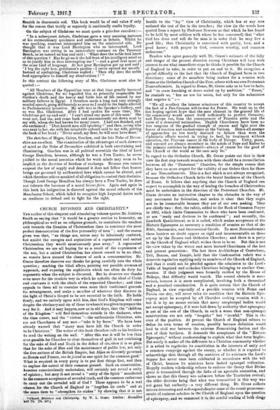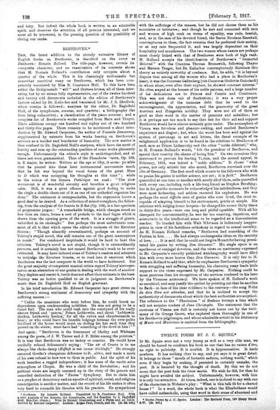CHURCH DIVISIO.NS AND CHRISTIANITY.*
Tee author of this eloquent and stimulating volume quotes Mr. Goldwin smith -as eraying that " it would be a greater service to humanity, on philosophical' as well as on religious grounds, to contribute the smallest- unit towards the Reunion of Christendom than to construct the most perfect demonstration of the free personality of man " ; and the reason given was that, "as things are, errors may be laboriously confuted, but amidst the energies -and,aspirations of -a regenerated and united Christendom they would spontaneously pass away." A regenerated Christendom we are all hoping for as -a result of the experienees of the war, but a united Christendom has almost ceased to be an ideal, so -remote have seemed the chances of such 4 consummation. Mr. Crane therefore deserves our thanks for going carefully into the whole question ; marking the blind alleys, pointing out possible avenues-of approach, and exposing the sophistries which too often do duty for arguments whon the subject is disc: meet'. But he deserves our thanks even mere for the resolute way in which he upholds the ideal of Christ end contrasts it with the ideals of the separated Churches;. and then appeals to them all to 'examine once more their traditional grounds for estrangement, and make -a -sacrifice of whatever they discover in the light of Christ's Gospel to be not essential to the faith. He holds firmly, and we entirely agree with him, that God's Kingdom will come despite the obstinacy and sin of those to whom it wasgivert to prepare the way for it. And it may happen, now as in old days, that the "children of the Kingdom " will -find themselms outside in the darkness, when the time comes, and the " violent "—the enthusiastic Christians, who are not Churchmen of any sect—" take it by force." We have been already warned that "many men have left the Church in order to be Christians." The writer of this book therefore calls to his brethren to read the writing on the wall. " After this war it will be less than evezepeasilde for Churches to clear themselves of guilt in not combining for the take of God and Truth in the defeat of sin, since it is so plain that for the-sake of Man and the maintenance of public law, not only the free nations of the British Empire, but Allies so diversely governed as Russia and France, can ix joined in one spirit for the commongood." What is required in every party is to put first things first, and then to explore the extent of their common ground. Such an examination, however conscientiously undertaken, will certainly not reveal a unity of opinion ; but may it not reveal a " unity of the Spirit " mauifested in the common acceptance of revealed truth, and the common endeavour to carry out the revealed will of God ? There appears to be a real thence for the Church of England to "lengthen its cords" and at the same time to " strengthen its stakes " by showing that it is not Church Divisions and Christianity. -By W. L. Came, London: g&CM3111111 and Co. (5s. net.) hostile to the " lay " view of Christianity, which has at any rate endured the test of fire in the trenches ; the view (in the words here quoted from a report by Professor Newsom as that which he has found to be held by most soldiers with whom he has conversed) that "what God has done and will do for man is in order that he may live a good life ; that Christianity is concerned with purity, love, and a good home ; with prayer to God, common worship, and common endeavour."
Readers who agree generally with Mr. Crane's estimate of the folly and danger of the present disunion among Christians will turn with interest to see what immediate steps he thinks it possible for the Church of England to take, in order to put an end to it. He recognizes a special difficulty in the fact that the Church of England faces in two directions ; some of its members being zealous for a reunion with Rome or the Orthodox Church of the East, others with our own Protestant Nonconformists. In regard to Rome, Mr. Grano asks us to bow to facts, and " to cease knocking at •doors sealed up by ambition." " Rome," he reminds us, " has no use for union, but only for the submission that negates it " :-
" We all recollect the intense reluctance of this country to accept the fact of a Pan-German will.to-war for Power. We went on to the lest hoping against hope that the sane element in the general life of the community would assert itself sufficiently to protect Germany, and Europe too, from the consequences of Prussian pride and the curse of a demented nationalism. English Churchmen have been no less sanguine of the gradual triumph of reason and light over the forces of reaction and exclusiveness at the Vatican. Hence.all manner of approaches no less surely destined to failure than were the diplomatic efforts wasted in trying to heal, by treatment without operation, the Prussian cancer in the body of Europe. Unity, peace, and concord are always secondary in the minds of Pope and Ka.- r to the primary ambition to dominate—always of course for the good of the Church or the world as the case may be."
In regard to the Orthodox Church, Mr. Grano points out that in dealt view the first step towards reunion with them should be a reconciliation between all the " Protestant " Churches, for the simple reason that they have no more respect for the validity of our Orders than for those of our Nonconformists. This is a fact which is not always recognized, because the Orthodox Church lacks the brutal frankness of the Church of Rome. It follows that anything that the Church of England can expect to accomplish in the way of healing the breaches of Christendom must be undertaken in the direction of the Protestant Churches. Mr. Crane devotes an instructive chapter to the obstacles in the way of any movement for federation, and makes it clear that they ought not to be irremovable because they are of our own making. They are chiefly two : first, the rubric, added to the Book of Common Prayer in 1662, which limits Communion to those who have been confirmed, or are " ready and desirous to be confirmed " ; and secondly, the Lambeth Quadrilateral, as it is called, which makes ,acceptance of the Historic Episcopate as necessary a condition of reunion as that of the Bible, Sacraments, and Oecumenical Creeds. To most Nonconformists these barriers no doubt appear as rigid and insurmountable as those set up by the Roman and Orthodox Churches ; and there is a party in the Chureh of England which wishes them to be so. But this is not the view taken by the wisest and most learned Churchmen of the last and present generations. The last three Arehbishops of Canterbury, Tait, Benson, and Temple, held that the Confirmation rubric was a domestic regulation applying only to members of the Church of England, and that it could not be pleaded against the admission to the Lord's Table of .baptized and orthodox Christians belonging to another Com- munion. If their judgment were formally ratified by the House of Bishops, that difficulty would vanish. The second obstacle is more serious, because it is more complicated, involving both a theoretical and a practical consideration. It is quite certain that the Church of England, in view especially of a possible reunion with Rome and Russia one day, will never relax its condition that the Historic Epie. copacy must be accepted by all Churches seeking reunion with it : but it is by no means certain that many unepiscopal bodies would not accept-episcopacy, if it were laid down by authority that episcopacy is not of the cue of the Church, in such •a sense that non-episoopa I ministrations are not only "irregular" but "invalid." This Is the crux of the position. At present the Church of England refuses to define its own terms of reunion, possibly because definition would lead to civil war between the extreme Romanizing faction and the rest of their brethren. It demands the acceptance of the " Historic Episcopate," without condescending to explain what that term hnplie'. But surely it makes all the difference to a Christian community whether it is asked to regularize its constitution in the interests of unity and a common campaign against the enemy, or whether it is required to acknowledge that through all the centuries of its existence the Lord's Supper has never once been celebrated in accordance with the will of Christ, because its ministers have lacked episcopal ordination. Happily modern scholarship refuses to endorse the theory that Divine grace is transmitted through the links of an apostolio succession, and shows us that this theory was unknown before the Tractarlan revival; the older doctrine being that abet was transmitted in this way was not grace but authority—a very different thing. Mr. Grano collects into an interesting and well-argued-chapter some of the recent pronounce- ments of eminent scholars in the Church of England upon the question
of episcopacy, and we commend it to the careful reading of both clergy and laity. But indeed the whole book is written in an admirable spirit, and deserve:, the attention of all persons interested, and we must all be interested, in the pressing question of the possibility of closing our ranks.







































 Previous page
Previous page